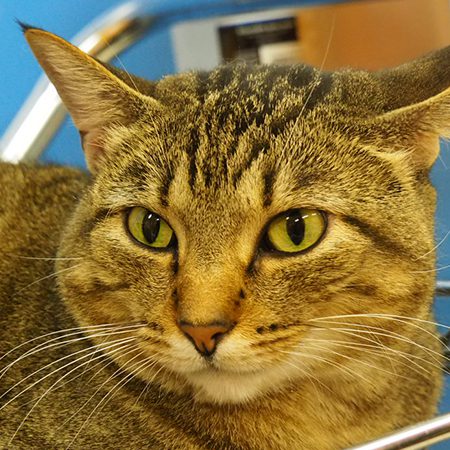Domestic Cat
Felis catus
The cat is a small carnivorous mammal, and the only domesticated species in the family Felidae. They are often referred to as a domestic cat to distinguish it from wild member of the family. Most cats are either a house cat, kept as a pet, or a feral cat, freely roaming and having minimal human contact. Like dogs, house cats are valued by humans for companionship, and sometimes its ability to hunt rodents. There are about 70 various cat breeds recognized by cat registries.
Cats are similar in anatomy to other felid species, they have strong flexible bodies, quick reflexes, sharp teeth, and retractable claws adapted to killing smaller prey. They are a predatory animal, most active at dawn and dusk, making them crepuscular. Cats have extremely well developed hearing, and can hear sounds too faint or too high for human ears. Compared to humans, they also have incredible vision in the dark, this is accompanied by a strong sense of smell, making them a great hunter.
It has been long thought that cat domestication was initiated in Egypt, where they have been revered since around 3100 BC. However the earliest indication for the taming of an African wildcat was found in Cyprus, there was a cat skeleton excavated in extremely close proximity to a human grave, dating around 7500 BC. As of 2017, the domestic cat is the second-most popular pet in the U.S., just behind the domestic dog.
Say Hello To Cub Creek's Cats: Wahini, Tux, & Friends

Cats are belived to have first been domesticated in the fertile cresent of Egypt and Mesopotamia; since then, their population has spread all around the globe.
HABITAT -Domesticated cats will either live in a home environment with a human, or interlaced with Urban environments.
DIET -There are both dry and wet cat food options, while feral cats forage in the wild.
FUN FACT -A group of cats can be referred to as a clowder or glaring.
SOCIAL BEHAVIOR -Although domestic cats are very comfortable social companions to humans and can live harmoniously with other animals, cats tend to be solitary animals in the wild.
ACTIVITY -They are known to be most active at dusk and dawn, making them crepuscular.
PREDATORS -While they can stay safe indoors, predators include coyotes, large birds of prey, and raccoons.
SIZE -Adult domestic cats usually weigh between 9 - 10 lbs. Size is very dependant upon which breed of cat you are studying.
RELATIVES -Close relatives of the domestic cat are the african wildcat and sand cat.
CONSERVATION -Domesticated cats have not been evaluated by the IUCN and are not currently at risk.
Cub Creek Animal Care Information
Housing - We have cats living all over camp, some in specialized indoor enclosures, and some free roaming around camp. All of them have safe spaces to sleep and rest at night with big soft cat beds. They all have a fresh supply of water available at all times during the day. All indoor enclosures are designed with areas for playing, sleeping, and climbing all to promote socialization and play. Whether its natural branches they play upon, steps on the walls, or clawing posts, they are always stimulated.
Diet - All of our cats have a constant supply of high quality cat food. This food provides all of the daily nutrition they need, of protein, vitamins, and minerals. Of course they also get special crunchy or chewy treats occasionally!
Enrichment - We have a special cat room with ramps on the walls, clawing posts, and steps that provides an environment that promotes playing and relaxation. All of our cats get plenty of socialization from humans, especially from our campers during the summer time. Campers will make toys for them out of feathers, cardboard, and plastic materials, they love to play with! For our few cats roaming around camp, they have the opportunity to utilize their feral skills in catching mice!

